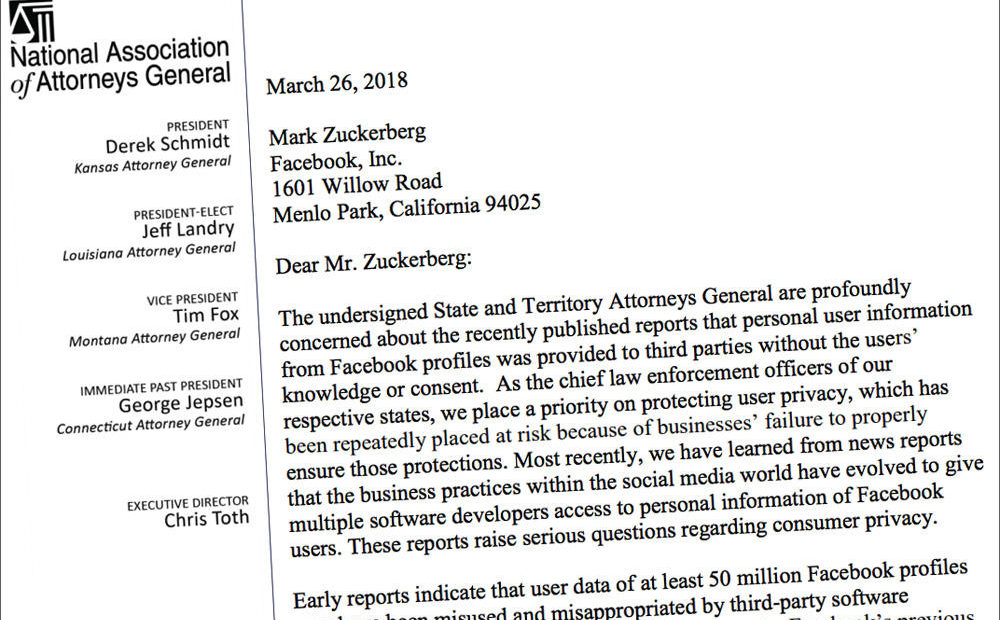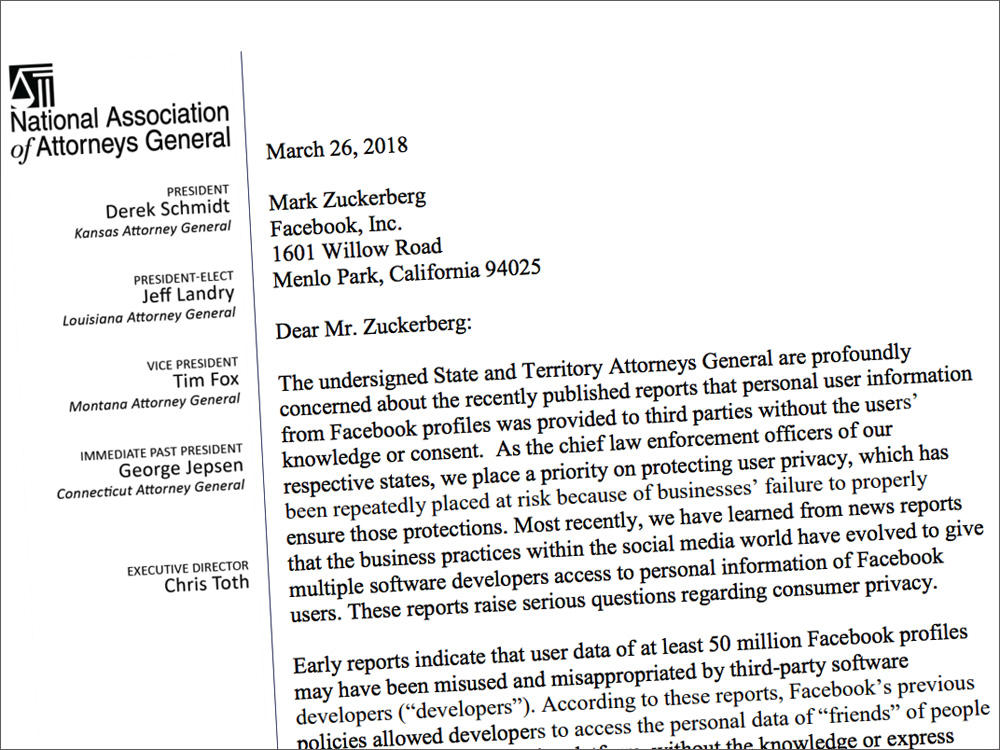
Washington, Oregon Attorneys General Demand Answers From Facebook
Listen
The Democratic attorneys general of Washington and Oregon joined 35 of their colleagues Monday in sending a letter to Facebook founder Mark Zuckerberg. The letter demands answers to several questions about Facebook’s privacy policies.
This follows reports that the profiles of 50 million Facebook users were misused by the British political consulting firm Cambridge Analytica, which had ties to Donald Trump’s campaign during the 2016 presidential election.
“These reports raise serious questions regarding consumer privacy,” the bipartisan group of attorneys general wrote in their letter, which was addressed to Zuckerberg and sent on National Association of Attorneys General letterhead.
The letter specifically focuses on Facebook’s previous practice of allowing third-party software developers access to the personal data of users who had not given their consent.
“These revelations raise many serious questions concerning Facebook’s policies and practices, and the processes in place to ensure they are followed,” the letter said.
Among the questions the attorneys general want Facebook to answer:
- “How many users in our respective states were impacted?”
- “When did Facebook learn of this breach of privacy protections?”
- “During this timeframe, what other third party “research” applications were also able to access the data of unsuspecting Facebook users?”
The letter also asks Facebook to provide an update on how the company will, going forward, allow users to more easily control their privacy settings.
“Facebook has made promises about users’ privacy in the past, and we need to know that users can trust Facebook,” the letter said. “With the information we have now, our trust has been broken.”
In a statement, Will Castleberry, Facebook’s vice president for state and local public policy, said: “Attorneys General across the country have raised important questions and we appreciate their interest. Our internal review of the situation continues and we look forward to responding.”
Also Monday, the Federal Trade Commission confirmed that it has launched an investigation into Facebook’s handling of personal data.
Last week, the attorneys general of Massachusetts and New York announced they were launching investigations into Facebook. Oregon Attorney General Ellen Rosenblum said she was considering an investigation. A spokeswoman for Washington Attorney General Bob Ferguson said the office does not comment on pending or possible investigations.
In a statement last week, Zuckerberg traced the release of the data to a 2013 request by Cambridge University researcher Aleksandr Kogan, who was creating a personality quiz app. In addition to accessing the data of the 300,000 people who installed the app, Kogan was also able to obtain data from some of those users’ friends. According to Zuckerberg, Kogan shared data from his app with Cambridge Analytica in 2015.
In his statement, Zuckerberg said steps were taken in 2014 to prevent apps from accessing the data of friends of users who had authorized the app. The statement also said Facebook began requiring developers to seek approval from Facebook before they requested sensitive data from users.
Going forward, Zuckerberg said the company will investigate all apps that obtained large amounts of user data prior to the 2014 change in policies, and conduct audits if it finds evidence of “suspicious activity.”
Facebook also said it will further restrict developers’ access to user data, including if a Facebook account holder hasn’t used a particular app in three months. Facebook also said it will release a new tool in the next month that will appear at the top of a user’s news feed identifying which apps they’ve authorized and providing steps to revoke those permissions.
“We will learn from this experience to secure our platform further and make our community safer for everyone going forward,” Zuckerberg wrote in his statement.
Copyright 2018 Northwest News Network
Related Stories:

Feel Like You’ve Lost Control Of Your Data? A Washington Lawmaker Wants To Change That
Following in the steps of the European Union and California, Washington lawmakers are considering a sweeping data privacy proposal that its sponsors say could become a model for the nation.

Washington AG Bob Ferguson Files Campaign Finance Lawsuits Against Facebook And Google
Washington Attorney General Bob Ferguson is suing Facebook and Google for campaign finance violations. The lawsuits filed Monday allege the companies failed to keep records about who purchased political advertising from them.

Amazon Echo Recorded And Sent Couple’s Conversation — All Without Their Knowledge
In what it called an “unlikely” string of events, Amazon says Alexa heard background conversation and misconstrued it as very specific directives.
















